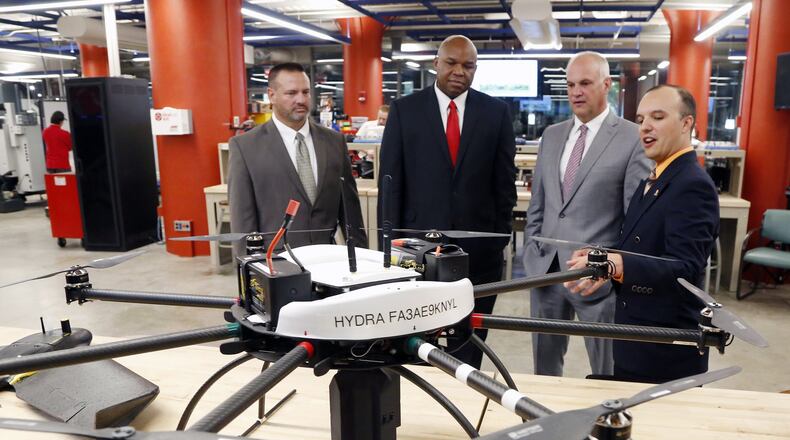”We think UAS is the future, and we have data to back that up,” said Adam Murka, a Sinclair spokesman.
The funding will be used in three main ways: Stoking interest among K-12 students in UAS and Science, Technology, Engineering and Math (STEM) fields, creating a new Sinclair one-year certificate in UAS entrepreneurial training — a certificate that will be linked to Sinclair associate and bachelor’s degrees — and creating a UAS-focused “kickstarter” competition.
MORE: Dayton company licenses UDRI tech
Ultimately, Sinclair leaders said they believe the program will meet a number of local needs, furthering STEM education and offering a way for people to create start-ups.
“It’s a real testament, I think, to (Sinclair’s) ability to build bridges, the ability to bring assets together,” said Scott Koorndyk, president of The Entrepreneur’s Center in Dayton.
Sinclair envisions a new one-year UAS/entrepreneurship post-secondary certificate that will be linked to both its current UAS Associate of Applied Science degree as well as a pending UAS Bachelor of Applied Science degree, which becomes official this fall.
The college says the training will open doors in a range of occupations, such as engineering, logistics, environmental protection, telecommunications, mapping, photography and more.
The funds will bring together regional and national partners, including community colleges elsewhere.
MORE: WYSO's Shakin' Dave announces retirement; Dayton party set for Sunday
“This is a national collaboration,” said Andrew Shepherd, Sinclair’s executive director and chief scientist, unmanned aerial systems. “We have partners in New Jersey and Minnesota that will be looking to Dayton as the main force, the driver in commercializing unmanned aerial systems.”
Sinclair has 356 students declared into a drone program of study, Shepherd said. Not all of them have an entrepreneurial bent, but in this field, they need at least an awareness of it, he said.
“We have had, I think, over 10 or a dozen students who have already started their own companies,” he added. “We really need to enable that, by providing resources to help.”
Koorndyk said in his role, he has seen hundreds of new companies of all kinds “bubble up” in the Dayton region just in the past three or four years.
“You name it, we’ve got it going on here,” Koorndyk said. “But the one thing that is crystal clear, is that the aerospace systems space is one of the real key assets.”
MORE: This Moraine manufacturer faces a huge OSHA penalty
Winning NSF grants is nothing new for Sinclair. The college has been awarded 65 NSF grants to date, totalling nearly $30 million.
A December 2017 McKinsey & Company study estimates that commercial UAS systems will have an annual impact of $31 billion to $46 billion by 2026. Drone activity has already seen speedy growth, from $40 million in 2012 to about $1 billion in 2017, the study said.
About the Author

